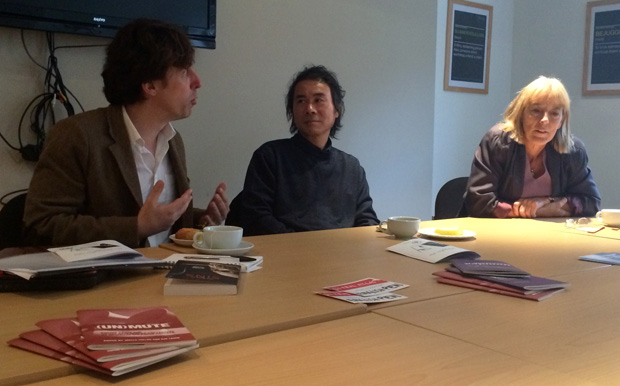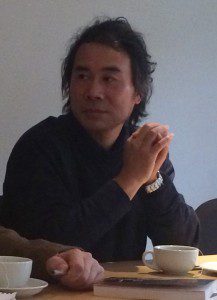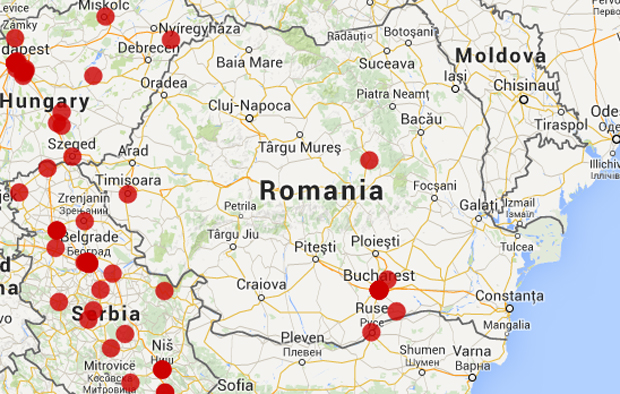9 Oct 2014 | Bahrain, News and features

Nabeel Rajab during a protest in London in September (Photo: Milana Knezevic)
Human rights activist Nabeel Rajab will stand trial on 19 October for allegedly insulting Bahraini government institutions on Twitter.
On 1 October, Rajab, president of the 2012 Index Freedom of Expression Award winner Bahrain Centre for Human Rights (BCHR) and director of the Gulf Centre for Human Right (GCHR), was summoned by the cyber crimes unit of the Criminal Investigation Directorate. He is alleged to have “denigrated government institutions” on Twitter, according to the Ministry of Interior. Rajab was released in May after two years in prison on charges including making offensive tweets and taking part in illegal protests.
The arrest came shortly after Rajab’s return to Bahrain following an international trip to raise awareness of human rights violations in his country. He was calling for the release of human rights activists — and father and daughter — Maryam and Abdulhadi Al-Khawaja. Maryam has since been released on bail, her travel ban lifted and trial postponed until 5 November. Abdulhadi continues to serve the life sentence handed down to him in 2011, after playing a prominent role in the country’s pro-democracy protests that year.
Rajab had been scheduled to appear before a judge Thursday afternoon to decide on whether to extend his 7-day pre-trial detention or to release him. But he was summoned to appear before the public prosecutor this morning.
A new complaint was lodged with prosecutors by the Ministry of Defence (MOD) in relation to the tweet. The MOD claims the tweet was insulting to the country’s security and military institutions. This morning’s interrogation lasted about 40 minutes, during which Rajab denied the charges and said that he was expressing his views on a public issue that is open for public debate, and it is his right of freedom of expression.
Rajab then met with his lawyer, who said she found out from Twitter that he had been referred to trial before the Lower Criminal Court – Chamber III on 19th October 2014. Rajab is now detained pending trial.
Rajab is now facing the charge of insulting/offending Public bodies based on the complaints filed by the Ministry of Interior and the Ministry of Defense. This crime is punishable by fine or by imprisonment which could reach up to 3 years based on the provisions of Article 216 read with Articles and 54 and 56 of the Penal Code which provide that:
Article 216: “A person shall be liable for imprisonment or payment of a fine if he offends by any method of expression the National Assembly, or other constitutional institutions, the army, law courts, authorities or government agencies.”
Article 54: “Imprisonment means the spending by a convicted person of the term of the prison sentence in one of the prisons facilities intended for this purpose in accordance with the Law. A prison sentences shall not be less than 10 days and shall not be more than 3 years unless the law otherwise provides.”
Article 56: “A penalty involving payment of a fine means obliging a convicted person to pay to the State the amount specified in the judgment. A minimum fine shall be BD1 and the maximum thereof, shall BD1,000 in case of felony and BD500, without prejudice to the limits prescribed by the Law for each offence. In determining the fine, a judge shall give regard to the financial condition of the convicted person. He shall be empowered to exceed the maximum by no more than double the amount if he deems fit.”
In September, Rajab spoke to Index about the human rights situation in Bahrain.
This article was posted on 9 Oct 2014 at indexoncensorship.org.
9 Oct 2014 | News and features, Politics and Society, United Kingdom

It’s the newsagents I’ll miss the most. There are few more reassuring signs of civilisation than a well-stocked newsagent.
The tiny shop next to my local London underground station lays out a trestle table every morning, upon which sits a vast range of papers; the UK nationals, of course, and the local north London papers. And then Irish local and regional papers. The Kerryman, the Anglo-Celt, the Roscommon Herald, the Kilkenny People, the Kildare Nationalist, like Patrick Kavanagh’s barge “bringing from Athy/ And other far-flung towns mythologies.”
Newspapers are enthralling, odd things. The idea that every day a short novel’s worth of text is somehow corralled into print is strange and brilliant. And yet, gather more than two print journalists, even from still-profitable publications, in a room, and talk will soon turn to managed decline of the newspaper industry in Europe and the United States, and how the industry must be more like Buzzfeed, or less like Buzzfeed (it is mandatory to have an opinion on Buzzfeed).
This week, a group journalists gathered in the House of St Barnabas in London’s Soho, to discuss whether or not Britain gets the press it “deserves”. The panel, chaired by Miranda Sawyer of the Bug Consultancy, featured journalists Sophie Heawood and Matt Kelly, and media analyst Douglas McCabe. Heawood, who recently took up the dream gig of The Guardian newspaper’s weekend magazine main column, spoke interestingly about her path into broadsheet journalism via music writing (proving the truth in the advice given to all aspiring writers, Heawood spotted the gap in The Guardian’s coverage of the London grime music scene and inserted herself in it). Heawood, who gave up a column with Vice for her current Guardian slot, pointed out the irony that while we all seem to be grieving for newspapers, she still saw it as a move up in the world to go from new media to old.
McCabe pointed out that while we grieve, lots of people are still going out every day to buy a newspaper. Eventually they may not, but this decline may not happen as soon as we think.
The venue, a candlelit chapel, lent the night a funereal air. Certainly the short speech given by former Daily Mirror features editor Kelly felt a little like a eulogy. Kelly talked about his time as an indentured apprentice on a small Merseyside paper 25 years ago, earning £4,000 a year, of learning the ropes of court reporting, local government, all the dull but necessary things vital to local journalism. He moved to the Liverpool Echo and then the Daily Mirror, where he started on a salary of £42,000 in 1996 (a number that drew gasps from the young audience, which, one suspected, contained quite a few people who were in the apparently common position of being “full-time journalists” who don’t really get paid).
The Scouse journalist recalled glorious times of fully-staffed newsroom where “the budget” was only something politicians needed to manage. He claimed to have had no idea how much money he spent on journalism over the years, but he had spent thousands on keeping undercover reporter Ryan Parry in Buckingham Palace for two months in 2003, a story which sticks in the brain mainly because it’s when we first found out that the Queen keeps her cornflakes in Tupperware. The story was a success: Daily Mirror circulation spiked by 25% for three days after initial publication.
This, Kelly suggested, does not happen anymore: once your story goes out on the web, it’s everywhere. That bounce is lost. But that was not the real concern, he suggested: the real concern was that the route through journalism he took was dead as a model, that young reporters were not learning the basics, and that the metric-measuring web would always lead people to favour clickbait over difficult stories. So do we get the press we deserve? No, suggested Kelly. We get a significantly better press than we deserve. Analytics appeared to show that people only really wanted to read titillation, and for years journalists and editors had kidded themselves that people admired them for their hard-hitting journalism.
This led Kelly to his conclusion: the public doesn’t even deserve the British press. Hacks work hard on genuine stories, and the public doesn’t read them.
It’s a humbling, sobering thought for a trade not known for humility or sobriety. All that work and there you are, utterly unappreciated. Ask the average person not engaged in the media to name a great scoop. They will say Watergate. Ask them for another, and they might say MPs expenses. Ask what papers, or even what journalists were responsible for them, and the people who have seen All The President’s Men might be able to answer.
For most people, journalism and the media are kind of nebulous background noise. In the past, you had some kind of reason why you bought a particular newspaper, even if that reason was just that you always bought that newspaper. Increasingly though, people are barely aware of what publication they’re reading. Ask a recent graduate what site they read every day, or what their preferred news source is, and they will say be more likely to say Twitter than The Guardian. Which is why that publication and others are scrabbling to find new ways to bond with people beyond encouraging the reader going to a shop and buying a newspaper.
This fragmentation brings up the question of whether newspapers will maintain their influential position in society (be that good or bad) and if not, whether this will affect arguments for press freedom as distinguishable from everyday rights and liberties. We witness versions of this question from time to time: when local bloggers are excluded from council meetings because they are not accredited press, even if they are the only people in the area willing and able to cover the proceedings, for example. In the past, papers have been defensive of their position (many journalists can still get a scarcely believable amount of contempt into the word “blogger”) but in the post-Leveson world, in Life After Brian, it’s apparent that there is an interest in ensuring that press freedom and free speech are universal.
Explore the latest issue of Index on Censorship magazine for discussion on the Seeing the future of journalism: Will the public know more? In print, online or on your iPad.
This article was posted on 9 October 2014 at indexoncensorship.org
8 Oct 2014 | Mapping Media Freedom, News and features, Politics and Society, Romania
In November, Romanians are set to head to the polls to elect a new president from a field of 14 candidates during two rounds of polling. But one important participant, the National Audiovisual Council of Romania (CNA), will be sidelined as it loses its legally mandated quorum.
According to the CNA’s website, its role is to “ensure that Romania’s TV and radio stations operate in an environment of free speech, responsibility and competitiveness.”
While the first round of voting is set to get underway on 2 November, the CNA’s quorum of eight will be halved on 4 November when four members of the council step down at the end of their terms. If no candidate wins a majority in the first poll, the top candidates will compete in a second round on 16 Nov.
“Without a quorum, the CNA cannot function, and thus it cannot sanction the eventual abuses of television or radio stations during the election campaign,” said Narcisa Iorga, a CNA board member. Iorga believes politicians will benefit from this, as it is in their best interests to have an inactive CNA. Television stations will also use the situation in their favor, though they are already accustomed to breaking the audiovisual legislation, she added.
According to some members of the council, it could be January before the CNA regains its quorum and the ability to make decisions on issuing sanctions, well after the election campaign and the two rounds of voting.
The CNA is Romania’s only regulatory body overseeing television and radio programmes. In its watchdog role, the regulator ensures that legislation governing programming is respected. It’s a key role in a country where television is the dominant media among the population. Political parties and interest groups use the country’s live television shows to get their message across to the public.
By law, the CNA is supposed to have 11 board members. To maintain a quorum, eight members need to be present at the proceedings. The members, who have a mandate of six years, are nominated by the senate (three members), the chamber of deputies (three), the president (two), the government (three), and are confirmed by the parliament.
This is where politics comes into play: the parliament, controlled by a coalition led by the party of Victor Ponta, the prime minister who is the best-placed candidate at the presidential elections, did not vote to confirm the new members before the parliamentary vacation began. Therefore in less than a month, the CNA will have only seven members, one member short of the quorum.
Not having enough members to be able to take decisions is nothing new for the regulatory body. When there are politically sensitive issues on the table, some of its members usually go on a vacation.
For example, on 9 October a number of complaints against the Antena 3 news television will be debated, but it is more than likely that will be no quorum. Two CNA members are currently on vacation, and another two just announced their absence, wrote Iorga on her Facebook wall.
Media violation reports from mediafreedom.ushahidi.com
Penal code change could ensnare journalists
Falun Gong practitioner detained during interview
Journalists denied access to government building
Director of public television receives “warnings”
Jurnalul National editor assaulted and threatened
This article was published on 8 Oct 2014 at indexoncensorship.org
6 Oct 2014 | China, News and features

From left to right: Harvey Tomlinson from MakeDo Publishing, Chen Xiwo and translator, Nicky Harman at English PEN. (Photo: Aimée Hamilton)
Chen Xiwo, described as “one of China’s most outspoken voices on freedom of expression for writers” by Asia Sentinel, has spoken about how he challenged the Chinese government’s decision to censor his latest book ahead of its launch in English.
The Book of Sins is a collection of seven novellas exploring controversial topics including rape, incest and S&M and examine the links between sexual and political deviance.
A heavily censored version of the book was published in China, in which parts of the text, including an entire novella, were removed.
Xiwo launched a case to sue China’s customs agency in an attempt to find out why his book, which was published in full in Taiwan, had been confiscated when it arrived in China in 2007. He was originally told that it was its dark and pornographic nature that had led to it being banned in its complete form.
In an unprecedented move, Xiwo took the customs office to court. He said in the history of the People’s Republic of China, since 1949, there has never been a case of a writer suing for not being allowed to publish a book.
Originally when the court hearings got underway the domestic news outlets were able to report on the progress until the propaganda ministry sent out an order forbidding further coverage.
During a meeting today run by English PEN at the Free Word Centre in London, Xiwo said: “These days these kind of orders are usually just made by phone call, so they won’t send an email where there’ll be a record, they do it by phone.
“This makes it even harder to get to the bottom of who’s banning what and why they’re doing it, because there’s no record.”

Chen Xiwo (Photo: Aimée Hamilton)
Eventually the court ruled that Xiwo’s case was a matter of national security, which ended further questions on the topic. In a blog entry for Free Word, Xiwo writes: “The Book of Sins had been impounded because it was deemed a threat to ‘national security’. In fact, they completely dropped the charge of obscenity. That meant they did not have to divulge any further information, or even say who had made the final decision.”
Xiwo’s book has now been translated into English by prolific translator Nicky Harman, who said: “Chen is a highly moral writer in my view. The sex and the small amount of violence, it’s never gratuitous. He really focuses on feelings, he has a good attitude towards women, he’s not misogynistic.”
One of the most provocative stories within the book, I Love My Mum, is about a disabled man who strikes up an incestuous relationship with his mother which ultimately ends in him murdering her. The novella is metaphorical of Chinese society and remains banned in the country.
When asked if he would challenge the banning of his books again, Xiwo said that it is inevitable future books of his will be banned, but he cannot launch a case for every one of them.
Although Chen Xiwo has written 10 books, he says only six or seven of these have been published in their complete form. The Book of Sins has won an English PEN award. Chen Xiwo will be launching the English translation of the book at Waterstones Piccadilly, tomorrow 7 October, at 7pm.
This article was posted on 6 October 2014 at indexoncensorship.org





